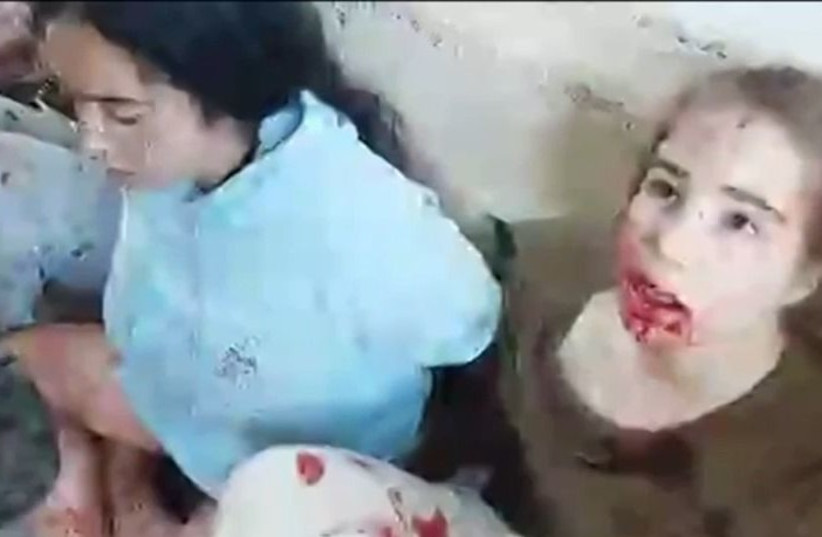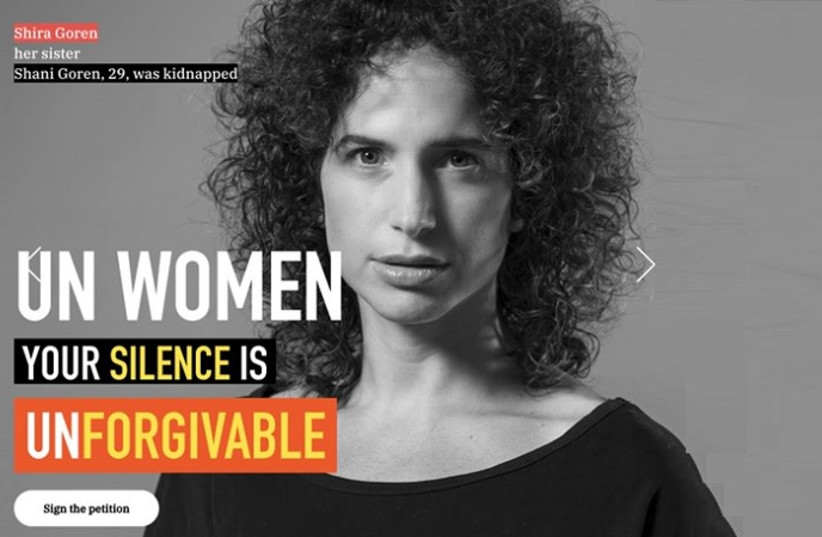Israel's Foreign Ministry criticized UN Women on Monday for making only one-and-a-half posts on X, formerly Twitter, about Israeli female hostages since December 2023 while mentioning Palestinian women 69 times during the same period.
In the 8-month period, the personal stories of 52 Gazan women were told while “Not a single story about an Israeli woman or a photo of one of the women who were abducted by Hamas, or the mothers of young Israeli women who are held by Hamas.”
“When photos of these women were published recently, bruised and weak in Hamas captivity, @UN_Women @unwomenchief did not say a word. It seems that Israeli women simply don't matter to them,” the ministry charged.
UN Women’s comments on the hostages
The Jerusalem Post found at least seven posts, either by UN Women or reposted by its account, that mentioned the hostages or condemned Hamas’s October 7 attacks in southern Israel. However, most of these posts also included calls for a ceasefire in Gaza or emphasized the humanitarian situation in the Strip.

In early December, UN Women posted, “We reiterate that all women, Israeli women, Palestinian women, as all others, are entitled to a life lived in safety and free from violence.”
In a reply to the post, the account added separately, “We unequivocally condemn the brutal attacks by Hamas on Israel on 7 October. We are alarmed by the numerous accounts of gender-based atrocities and sexual violence during those attacks.”
The UN Women’s complete statement at the time led with “regret that military [Israeli] operations have resumed in Gaza.” In the second to final paragraph, it added, “We continue to call for accountability for all acts of gender-based violence committed on and after 7 October, the immediate and unconditional release of all remaining hostages, and a humanitarian ceasefire.”
In January, UN Women Executive Director Sima Bahous released a statement relating to the conflict where she drew attention to “the horrors of the Hamas attacks on Israel of 7 October and the horrors that have followed, especially in Gaza.”
After discussing the circumstances of Gazan women in the context of the war started by Hamas, Bahous concluded her statement with, “It is also more than 100 days that the families of those held hostage in Gaza, some of whom I have met, have waited in unimaginable pain for those they love to return to them. Their courage in the face of suffering and their commitment to peace is humbling. I call again for all hostages to be released immediately and unconditionally.
“This is a time for peace. We owe this to all Israeli and Palestinian women and girls. This is not their conflict. They must no longer pay its price.”
In March, five months after Hamas attacked southern Israel, the account posted a condemnation of the sexual violence utilized by the terror group on October 7 and against hostages held in Gaza since they were abducted.
United Nations Special Representative on Sexual Violence in Conflict Pramila Patten heard the testimony of released hostages and October 7 survivors in February. The UN used her findings for a report on Hamas's sexual violence.
Accusations of bias
In November, UN Women posted a condemnation of the sexual violence - naming Hamas as the perpetrators. However, the page quickly deleted the post and shared a plea for the release of hostages.
“We condemn the brutal attacks by Hamas on October 7 and continue to call for the immediate and unconditional release of all hostages,” read the initial statement.
UN Women told the Jewish Telegraphic Agency that the Instagram post had been scheduled in advance and was deleted because the message in it no longer reflected where the organization wanted to put its primary focus.
“In any social media team managing multiple campaigns and during a very busy time like the one we are now with 16 Days of Activism, mistakes can occur,” a representative for UN Women said in a statement sent to the Jewish Telegraphic Agency.
“UN Women social media team had pre-planned days in advance [of] this particular post, but then the news broke on the release of hostages, and we really wanted to focus on that,” she said. “UN Women has condemned the attacks by Hamas and the deaths of Israeli civilians from the beginning, as well as called for the release of hostages, and we will continue doing so until the conflict ends. We have also called for all allegations of gender-based violence to be rigorously investigated, prioritizing the rights, needs, and safety of those affected.”
The deleted post caused significant backlash and kickstarted the social media campaign #MeToo_UNless_UR_a_Jew.

The female hostages in Hamas captivity
The condition and treatment of female hostages have been of great concern as Hamas’s use of sexual violence was extensively documented on October 7.
In May, a video showing Hamas's mistreatment of female IDF observers was released by the Hostages and Missing Families Forum. The three-minute video revealed the bloodied conditions of the hostages Liri Albag, Karina Ariev, Agam Berger, Daniela Gilboa, and Naama Levy.
IDF translators provided Hebrew and English subtitles, and about midway through the clip, the subtitles read: “Here are the girls (women who can get pregnant).”
The terrorists referred to the women as “Sabaya,” meaning sex slave.
In April, former hostage Noga Weiss revealed that her captor had insisted she marry him and have his children.
“He told me, ‘Everyone will be released, but you will stay here with me and have my children,’” she recalled. “I pretended to laugh so he wouldn’t shoot me in the head.”
“People don’t understand the feeling of fear,” Weiss said. “I was 50 days, 24/7, with the thought that they would get tired of me and just shoot me, or that they wouldn’t need me in the end, or that they would shoot us while we slept in the middle of the night.
“Their moods changed so quickly. One minute they played with us and laughed, the next they’d come in with a gun. You always had to please them.”
Moran Stella Yanai, another released female hostage, recounted in June the brutal treatment she was subjected to. In addition to beating her, Yanai said that they forced her to climb six flights of stairs in high heels with her broken ankle after they tore off her cast.
